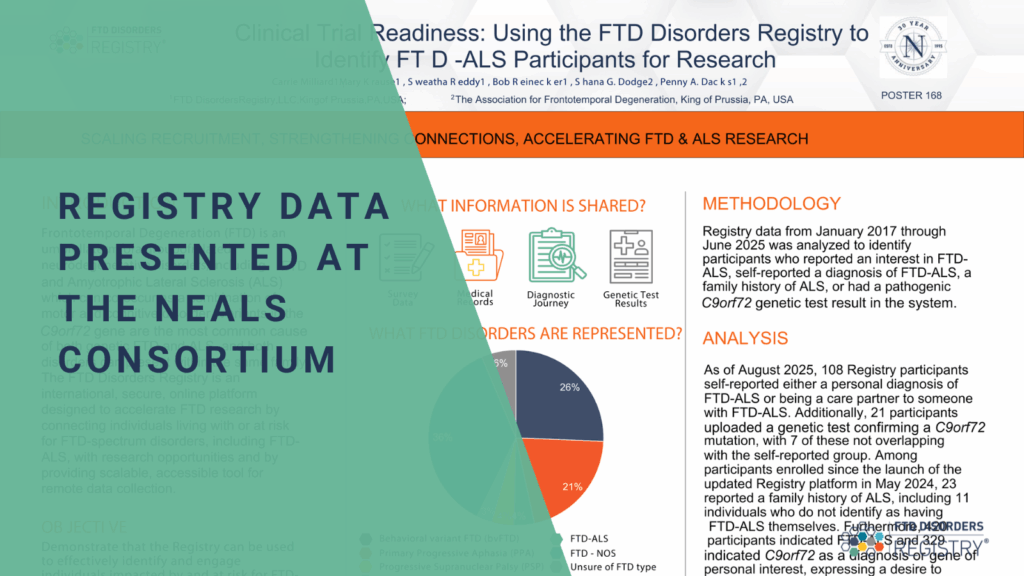PRESS & NEWS
Registry Data Presented at the NEALS Consortium

Registry data is helping to bridge the gap between the FTD and ALS research communities and to accelerate recruitment for future clinical trials.
At the 2025 Annual Meeting of the Northeast Amyotrophic Lateral Sclerosis (NEALS) Consortium, Carrie Milliard, MS, CGC, CCRC, Registry Director for the FTD Disorders Registry, presented a poster titled Clinical Trial Readiness: Using the FTD Disorders Registry to Identify FTD-ALS Participants for Research. The presentation highlighted how the Registry is helping to bridge the gap between the FTD and ALS research communities and to accelerate recruitment for future clinical trials.
Background
Frontotemporal Degeneration (FTD) and Amyotrophic Lateral Sclerosis (ALS) are part of a spectrum of related neurodegenerative disorders. Variants in the C9orf72 gene are the most common cause of both genetic FTD and ALS, and both conditions can appear within the same family. To help researchers connect with these overlapping populations, the FTD Disorders Registry, a secure, international, direct-to-participant platform, collects data from individuals diagnosed with FTD, those at genetic risk, family members, and caregivers.
Study Objective and Methods
The poster aimed to demonstrate how the Registry can identify and engage individuals affected by or at risk for FTD-ALS, helping to strengthen clinical-trial readiness for both FTD and ALS studies.
Researchers analyzed data collected from May 2024 through August 2025 to identify participants who:
- self-reported an FTD-ALS diagnosis;
- were care partners for someone with FTD-ALS;
- had a family history of ALS; or
- uploaded a genetic test confirming a C9orf72 mutation.
Key Findings
As of August 2025, the Registry included:
- 108 participants who self-reported an FTD-ALS diagnosis or were a care partner for someone with FTD-ALS;
- 21 participants who uploaded a genetic test confirming a C9orf72 mutation, seven of whom did not overlap with the self-reported group;
- 23 participants reporting a family history of ALS, including 11 who do not identify as having FTD-ALS themselves; and
- 420 participants expressing interest in FTD-ALS research and 329 interested in C9orf72-related studies.
These numbers show that the Registry can be an effective tool for identifying and connecting individuals from the FTD-ALS spectrum with research opportunities.
Implications
Carrie Milliard’s poster underscored how the Registry’s scalable infrastructure, international reach, and digital tools make it well suited for decentralized clinical trials and for fostering collaboration between FTD and ALS research communities. By building shared recruitment strategies and centralizing participant engagement, the Registry can help improve the efficiency of trial enrollment and accelerate the development of future therapies.
Looking Ahead
The FTD Disorders Registry’s evolving platform continues to support researchers, healthcare providers, and families alike by collecting data, promoting education, and facilitating connections that drive discovery. As more participants join and share their experiences, the Registry is helping to ensure that no voice in the FTD-ALS community goes unheard.
Together we can find a cure for ftd
The FTD Disorders Registry is a powerful tool in the movement to create therapies and find a cure. Together we can help change the course of the disease and put an end to FTD.
Your privacy is important! We promise to protect it. We will not share your contact information.



